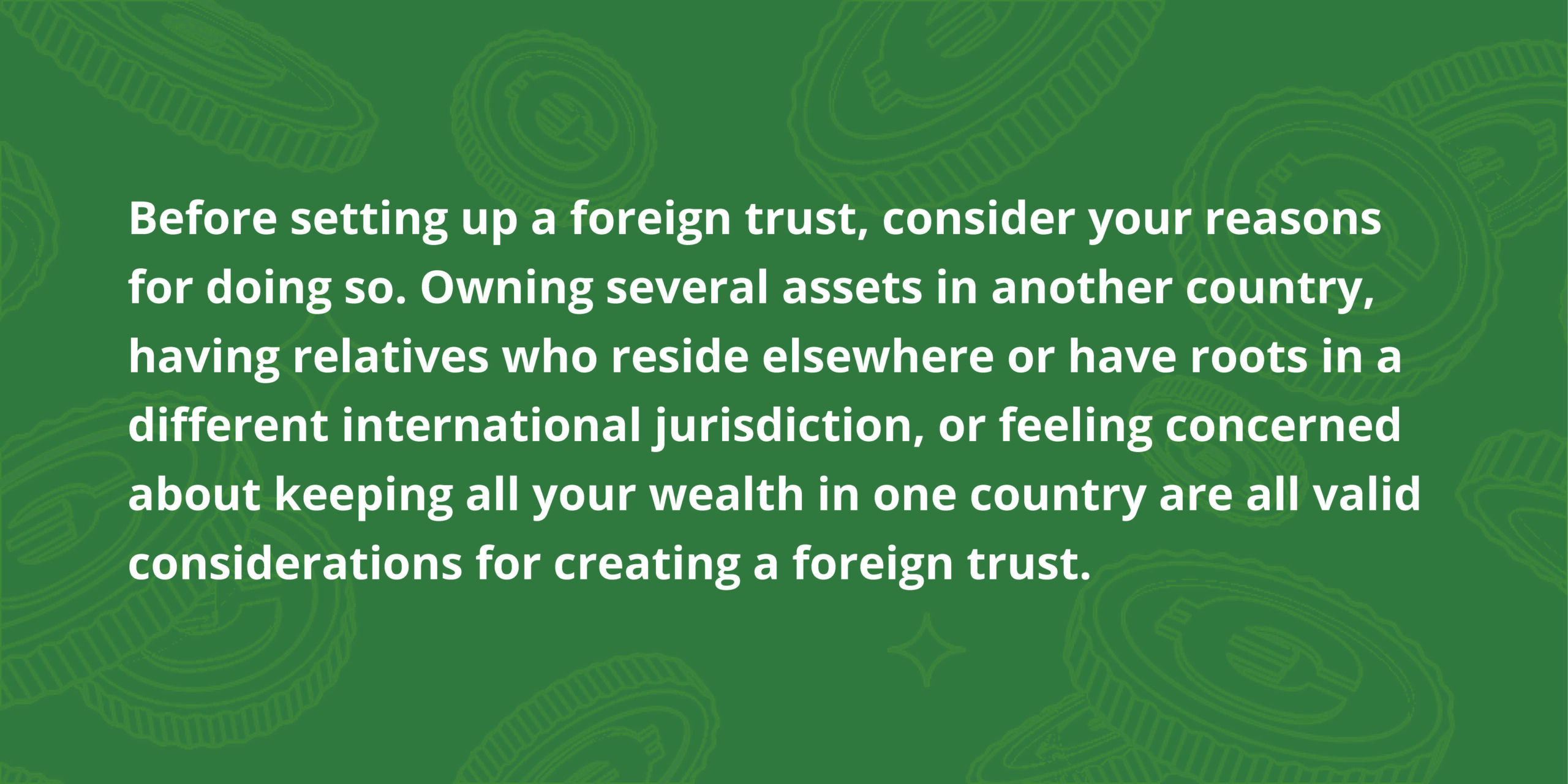8 Tips for Establishing a Foreign Trust

A trust is a key tool in the world of estate planning. Particularly for high-net-worth and global families, an attractive option to consider when planning how to handle family wealth is a foreign trust. And for good reason: trusts offer unparalleled flexibility and asset protection. They can be used as a way to diversify assets, ensure wealth is passed down thoughtfully and strategically, and guard against political and economic issues that may threaten assets. Foreign trusts can help protect and preserve a family’s wealth, and serve the needs of family members scattered across the globe. There are unique strategic and legal considerations when creating a foreign trust, however. An experienced Naperville, IL estate planning attorney can advise high net-worth families on the benefits of a foreign trust and the considerations to keep in mind when setting one up.
What Is a Foreign Trust?
A foreign trust is a trust that is established in a foreign country. These trusts are subject to the estate planning laws of the jurisdiction in which they were set up, although you would still have to report them for U.S. tax purposes and they may have tax consequences here. Like a traditional U.S. trust, it is a legal arrangement whereby a trustee holds assets for one or several beneficiaries. Although they often get a bad reputation in movies and on TV shows, they are perfectly legal financial instruments.
Foreign trusts, also known as international or offshore trusts, have many benefits. First, they are able to protect assets in a way that would not otherwise be possible under U.S. law because of taxation and other various elements involved. Trusts can offer stability when they are established in a country whose policies are unlikely to change. Additionally, foreign trusts can have high litigation costs, which might make it unattractive for creditors to pursue claims against them, thus further maximizing asset protection.
8 Tips for Establishing a Foreign Trust
Tip #1: Clarify Your Reasons
While foreign trusts do have many benefits, they work best as a strategic part of a comprehensive estate plan. Before setting up a foreign trust, consider your reasons for doing so. Do you own several assets in another country? Does your family reside elsewhere part of the time or have roots in a different international jurisdiction? Perhaps you are concerned about keeping all your wealth in one country. These are all valid considerations for creating a foreign trust.

Tip #2 Understanding How Foreign Trusts Differ From Domestic Trusts
Although in terms of their basic operation, foreign trusts operate the same as domestic trusts, they are subject to different taxation laws and reporting requirements. From a legal perspective, they are also more complicated to set up and may require additional paperwork and a review of both foreign and domestic laws. Foreign trusts may also offer enhanced asset protection depending on the trust jurisdiction.
Tip #3: Choose the Right Trustee
The trustee manages the trust assets, so just like with a domestic trust, it is crucial to choose someone trustworthy and professional. With a foreign trust, that need is enhanced given the distance and the fact that you may be less knowledgeable about that particular jurisdiction’s rules. You should select someone who you know is aware of the ways trusts operate in the jurisdiction where the trust is established.
Tip #4: Choose the Right Jurisdiction
The jurisdiction you choose for your foreign trust will have a significant impact. You should select a location with regulations that protect the trust and your assets and that enjoys relative political and economic stability. The right jurisdiction will also respect international trust administration standards. Of course, the tax framework of the country where you establish your foreign trust is also an important consideration.
Tip #5: Understand Trust Classification
For U.S. purposes, a trust is considered a foreign trust if it passes the court test and the control test. If a trust fails these tests, it could be considered a domestic trust, negating any intended benefits. A trust passes the court test if a U.S. court has primary supervision over its administration if any issues arise that need to be resolved. It will fail the control test if one or more U.S. people control the trust’s “substantial decisions.”
Tip #6: Distinguish Between Trust Types
There are two main trust types, the foreign grantor trust and the foreign non-grantor trust. These have an impact on taxation (more on that below). Under the foreign grantor trust, a U.S. person (the grantor) creates the trust. The U.S. grantor continues to be a beneficiary of the trust. These trusts are generally subject to U.S. taxes to an extent. Any trust that is not considered a foreign grantor trust will be treated as a non-grantor trust. These are not typically taxable in the U.S. unless they earn income here, but U.S. beneficiaries may be taxed on the distributions they receive.
Tip #7: Consider Taxation Issues
As the differences between foreign grantor and foreign non-grantor trusts attest, there are complex taxation implications that come with foreign trusts. Together with your estate planning attorney, you should review the tax implications of a foreign trust and ensure that you are choosing something that does not impose a heavy tax burden on your estate.
Tip #8: Remember Reporting and Compliance Requirements
Foreign trusts have significant reporting and compliance requirements, and failure to comply can result in massive fines. In addition to the tax return, certain U.S. grantors, trustees, and beneficiaries may have to file multiple additional forms with the IRS. This is intended to ensure that foreign trusts comply with international law and to prevent illegal activity like tax evasion and money laundering.
Call a Naperville, IL Estate Planning Attorney
At Gierach Law Firm, our experienced Naperville IL estate planning attorney works together with high-net-worth families to structure complex estate plans that utilize the many tools available to safeguard a family’s assets. She combines her education as an attorney with her certification as a CPA and a master’s degree in business to serve her clients. If you seek dedicated legal representation for establishing a foreign trust, call our office at 630-756-1160 to schedule a confidential consultation so we can review your estate and your needs and offer useful guidance on how to move forward.
Practice Areas
Archive
+2016
+2013
Please note: These blogs have been created over a period of time and laws and information can change. For the most current information on a topic you are interested in please seek proper legal counsel.














